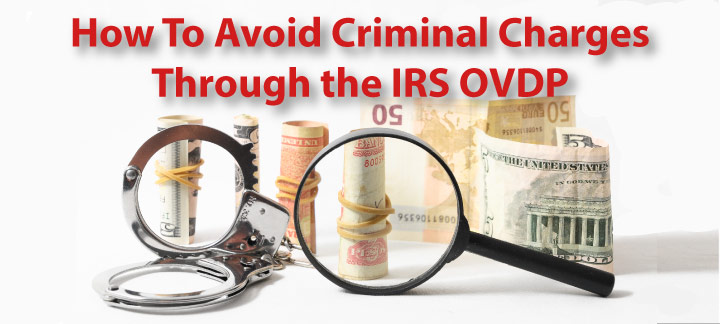How to Avoid Criminal Charges Facing Taxpayers Who Do Not Participate in OVDP
In addition to the numerous civil penalties potentially facing taxpayers who fail to participate in the Offshore Voluntary Disclosure Program, there are also some serious criminal charges that may result if the IRS decides to examine a particular taxpayer.
What Criminal Charges Might Result from Failing to Submit to OVDP?
Taxpayers with undisclosed foreign assets and accounts are potentially subject to criminal charges for tax evasion, filing a false return, and failure to file an income tax return. Under IRC § 7201, a taxpayer who willfully attempts to evade or defeat tax shall be guilty of a felony. Upon conviction of the felony of tax evasion, the taxpayer will incur a fine of no more than $250,000, or a prison sentence of no more than 5 years, or both. So, if a taxpayer has undisclosed foreign asset or accounts and failed to pay taxes on those assets and accounts, the taxpayer is possibly at risk for a criminal charge of tax evasion. However, if the taxpayer preemptively applies for OVDP before the IRS discovers the existence of the foreign assets and accounts, he or she can possibly avoid criminal prosecution for federal tax crimes.
Under IRC § 7206(1), filing a false tax return can result in a criminal felony charge. The punishment for failing a false return under IRC § 7206(1) is a fine of no more than $250,000, or a prison sentence of no more than 3 years, or both. Failure to file an income tax return under IRC § 7203 can result in a prison term of up to one year, or a fine of $100,000 or both. In these two cases, the taxpayer who would have been subjected to these criminal offenses would have potentially been protected if he or she had voluntarily participated in OVDP before the IRS discovered the infractions.
Other potential criminal charges include conspiracy to defraud the government under 18 U.S.C. § 286 and conspiracy to commit offense or defraud the United States under 18 U.S.C. § 371. Both are punishable by possible prison for up to five years, a fine of up to $250,000, or both.
Criminal Charges for Failing to File an FBAR under OVDP
Another potential criminal charge that may result if a taxpayer does not participate in OVDP relates to the FBAR filing requirement. Any taxpayer with foreign financial accounts or assets should consider whether he or she has a duty to file an FBAR report. The FBAR filing requirement applies to any U.S. person if the aggregate value of the person’s foreign accounts exceeds $10,000 at any point during the calendar year. Those FBAR taxpayers who willfully fail to file their FBAR as required are susceptible to criminal charges if the IRS discovers their noncompliance. Specifically, willful failure to file an FBAR report can result in a rather severe criminal penalty under 31 U.S.C. § 5322, consisting of a prison sentence of up to 10 years in addition penalties up to $500,000. It is important to note that in order to warrant criminal prosecution, the failure to file an FBAR report must be a willful decision on the part of the taxpayer, as opposed to mere negligence.
How a Tax Attorney Can Help
Clearly, the existence of undisclosed foreign financial accounts and assets is a topic which the IRS takes very seriously. In recent years, the IRS has stepped up its efforts to detect and prosecute U.S. taxpayers who willfully fail to report the true nature of their foreign financial accounts and assets. Although the penalties can be severe, the existence of the Offshore Voluntary Disclosure Program gives the potential of some relief from the harsh criminal consequences that may face taxpayers with international interests. If you have undisclosed offshore foreign accounts or assets, you may be eligible to participate in OVDP. In order to evaluate whether OVDP is the right decision for your international tax situation, you should consider consulting a knowledgeable international tax attorney. The OVDP program is rapidly changing, but a tax attorney can help you navigate the confusing aspects of the IRS program.
The Tax Lawyer - William D Hartsock Tax Attorney Inc. has been successfully helping clients with tax issues related to their foreign assets since the early 1980s. Mr. Hartsock offers free consultations with the full benefit and protections of attorney client privilege to help people clearly understand their situation and options based on the circumstances of their case. To schedule your free consultation simply fill out the contact form found on this page, or call (858) 481-4844.



Comments (0)